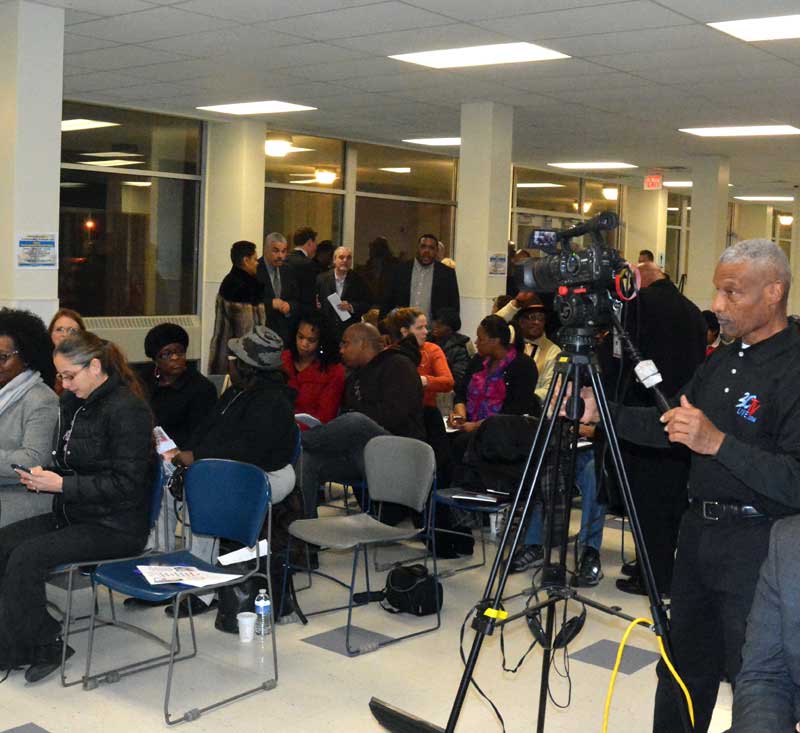Community Benefit Agreements could be a win-win for developers, Coatesville
By Mike McGann, Editor, The Times
 COATESVILLE — For nearly two decades, revitalization has been the ongoing refrain in the city. With a handful of notable exceptions, it is the failure of that effort — especially as similar efforts in West Chester, Phoenixville and Kennett Square have taken root — that has left some in the community questioning whether future efforts will ever bear fruit.
COATESVILLE — For nearly two decades, revitalization has been the ongoing refrain in the city. With a handful of notable exceptions, it is the failure of that effort — especially as similar efforts in West Chester, Phoenixville and Kennett Square have taken root — that has left some in the community questioning whether future efforts will ever bear fruit.
Nearly 200 city residents and elected officials gathered Thursday night at the city campus of Lincoln University to talk about the concept of using community benefit agreements to potentially lure developers to the city. The conversation was spurred by state Sen. Andy Dinniman, who formed an ad-hoc committee featuring City Council members, local clergy and other community members, as redistricting placed the city in his district. With the new train station project moving into full swing, Dinniman is serving as point person between the city and state officials — including those from the Pennsylvania Department of Transportation.
Dinniman argues that the new station offers an opportunity to engage in a rebirth of the area between 1st and 3rd avenues ranging from the Fleetwood street station as far as Kersey Street. Thursday night’s meeting was to collect input from the public on what is wanted.

Nearly 200 Coatesville residents and local officials packed a meeting to discuss options for redevelopment, Thursday night.
“They say people in Coatesville don’t care — that they won’t turn out,” Dinniman said. “But tonight showed that they will, if they feel like someone is going to listen to what they have to say.”
City Council Vice President David Collins said that now is the time — in part because of the looming train station project, but also because now there is in place a City Council ready to make redevelopment a reality, a group, he said, is focused on the needs of the city, rather than other interests or infighting as has been the case in the past.
Dinniman, Collins and City Council President Joe Hamrick are all supporting the concept of the CBA as a strong instrument for the city to use — and not something that would dissuade developers from looking at the city. But that is an opinion that is not shared across some parts of the city — and even in city government.
Among those who disagree are the city’s entire Redevelopment Authority — which recently voted unanimously against seeking such agreements. Jack Burkholder, CRA vice chair, spoke at the meeting, saying that he an his colleagues feel that putting conditions on development will make a difficult situation worse.
“We need a carrot to get them (developers) here,” Burkholder said.
Collins counters by saying that it is fear of trying that is the real enemy — that most developers would be willing to talk conditions if it means expedited construction.
“Fear is an amazing tool,” he said. “A lot of fear is built on ‘what-ifs.’ But if we allowed fear to take over, we wouldn’t be flying airplanes, driving cars or riding trains.”
Streamlining development, though, is no small issue for developers. For small businesses, it can mean tens of thousands of dollars per month in savings; for bigger companies and developments, a quicker, more efficient development process can mean a savings in the millions.
Around Chester County other municipalities are using similar incentives — I stood in the middle of one such project in West Sadsbury, just a few hours before the meeting. Victory Brewing company built a new brewery there in part because township officials made it clear they were wanted. The township didn’t cut any corners, but made sure development went forward smoothly and predictably — and it went from rough concept to built in less than two years.
In too many municipalities in the county, development projects are stalled or even derailed by local officials who constantly change their requirements midstream, communicate poorly (or not at all), don’t know their own zoning and state building code, can’t execute escrow agreements, and worse, in limited instances have been known to have their hands out seeking illegal bribes from developers and property owners.
Any municipality that can promise a clear, straight-ahead process — one with minimal detours and slowdowns — immediately becomes vastly more attractive. Vastly, as in likely to have developers knocking one’s door down.
So much so, that CBA’s aren’t an unreasonable approach — similar agreements have been used to fund parks, trails, roads and more throughout the county — and are increasingly understood as the way developers are expected to give back to the community and be good citizens. In addition, such conditions often increase the value of the properties under development, which means virtually everyone benefits from such agreements.
All of these things could be great for the city — if the elected leaders follow through and the residents of the city hold them to their word. While there may and probably will be setbacks, the city won’t come back if everyone doesn’t get behind the effort and hold everyone involved accountable.
And while it is early in the process, there is reason for cautious optimism, something long in short supply in Coatesville.






